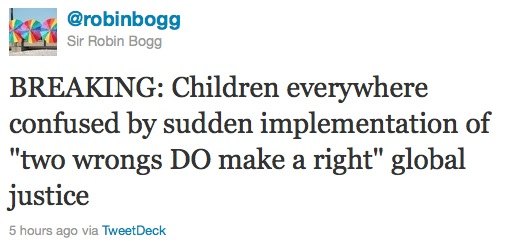 The death penalty is nothing new but it caught my eye because of Osama Bin Laden reportedly being killed and because of the “let’s shoot the looters” comments I saw on a Christchurch earthquake Facebook page.
The death penalty is nothing new but it caught my eye because of Osama Bin Laden reportedly being killed and because of the “let’s shoot the looters” comments I saw on a Christchurch earthquake Facebook page.
Death to the death penalty (video)
Stop the death penalty (video)
Let’s assume that Bin Laden was killed and buried straight away in the… ocean? This example is interesting as he wasn’t killed after he was sentenced to death by a court. However Obama said he: “…[made] the killing or capture of Bin Laden the top priority…”
Whether Bin Laden was killed intentionally or not I’m not sure. Now his body is in the water so we might not ever know. However I found the outpour of support for Bin Laden’s death and even the celebration resulting on sites like Twitter extremely interesting. And a lot of people were celebrating. I wondered if all of those people would support capital punishment in less extreme circumstances, like for the murder of one person? Or whether this event has changed their views to support the death penalty?
Did this bring about justice? I say no. A civilized trial would have created justice, in my opinion. Some said that the celebrations were justified because it symbolized the fighting and winning against terrorism. Because a figurehead of terrorism was downed. But Bin Laden was just that, a figurehead. Did he encourage hate, hurt and violence? Yes. Did he pull the triggers himself? No. Will someone take over his place leading Al-Qaeda? Yes.
More importantly, does this mean I’ll be able to take my bottle of water through airport security now?
The permanence of capital punishment is concerning. How sure would you need to be of someone’s guilt to support an execution? What if mistakes were made? Are a few false positives alright?
Does the death penalty grant relief to the suffering victim’s families?
This editorial in the New York Times says no: ‘In an open letter to the Connecticut Legislature, relatives of murder victims — 76 parents, children and others — wrote that “the death penalty, rather than preventing violence, only perpetuates it and inflicts further pain on survivors.”’ The death penalty deepens the wounds and the pain of victims’ families and the accused’s family. It creates more victims and continues the cycle of violence.
This page has stories from inmates’ families on how they’ve been affected by an execution. Bill Babbitt turned in his brother for committing a murder and was under the assumption that his brother would get the help he needed. His brother who was a paranoid schizophrenic was sentenced to death. Robert Meeropol talks about having both of his parents executed when he was six-years-old.
The death penalty makes it easy to “solve” re-offending without having to deal with the policies behind parole. It’s also easy to say prison officers would be protected, when in reality issues surrounding staff security need to be sorted.
Instead of putting forward the death penalty as a solution for crime, let’s create better policies. Policies that identify youth that are at-risk of offending. Better mental health services. Let’s remind ourselves that people released from prison need support starting well before they’ve been released to successfully assimilate back into society.
Alternatives to capital punishment might be the way out. Harris County, Texas, District Attorney Johnny Holmes says “you’re not going to find 12 people back-to-back on the same jury that are going to kill somebody when the alternative is throwing away the key.”
Is there a humane way to kill someone?
By poisoning with the lethal injection? Where are those drugs coming from?
Texas was reluctant to release where the drugs they use in their death row come from. Besse Medical, apparently. Feigning ignorance, Besse say they “…[have] no way to determine what its customers, including the Texas corrections department, does with its products.”
That article reports a shortage of U.S. made lethal injection drugs and says states have had to import from overseas. As overseas countries ban the export of those drugs for use in executions (“that supply dried up after the British government in November banned its export for use in executions”) and drugs are imported from dubious sources or drugs are reappropriated, concerns should be raised over the quality and efficiency of the drugs being used. Are they going to kill someone quickly and painlessly? Oklahoma is using an anesthetic, pentobarbital, that’s used in animal euthanasia solutions.
What level of training do the people administering the drugs have regarding administration or dosage?
Short answer: University of Miami researchers say none. It appeared prisoners were assumed to be successfully anaesthetised if they were given a standard dose of thiopental, but this wouldn’t be true if the drug was given incorrectly, the execution took longer than anticipated or the prisoner had anxiety or serious substance abuse issues. After analyzing autopsy data for 49 prisoners who had been executed, researchers found that in 43 cases the concentration of anaesthetic in the prisoners’ blood were lower than required in surgery. Out of those 43, 21 of the concentrations “were consistent with [the prisoner] being aware of what was going on.”
…the researchers, led by Dr Leonardis Koniaris, said: “We certainly cannot conclude that these inmates were unconscious and insensate.”
“However, with no monitoring and with little use of the paralytic agent, any suffering of the inmate would be undetectable.”
They add: “The absence of training and monitoring, and the remote administration of drugs, coupled with eyewitness reports of muscle responses during execution, suggest that the current practice for lethal injection for execution fails to meet veterinary standards.”
As a society we can do better than a primitive band-aid on the long-term problem of crime.
See also: an eye for an eye ends up making everybody blind.
Image credit: World Coalition Against the Death Penalty

 Some people have commented that the Royal Wedding is going to encourage support for the monarchy from New Zealanders. I disagree. The wedding highlighted a lack of Kiwiness. A fairy-tale story of princes and princesses. A lavish old-fashioned ceremony. Backward gender roles. People from other countries enjoyed the wedding without being part of the monarchy.
Some people have commented that the Royal Wedding is going to encourage support for the monarchy from New Zealanders. I disagree. The wedding highlighted a lack of Kiwiness. A fairy-tale story of princes and princesses. A lavish old-fashioned ceremony. Backward gender roles. People from other countries enjoyed the wedding without being part of the monarchy. HRC pressures King & Spalding to drop case defending the
HRC pressures King & Spalding to drop case defending the